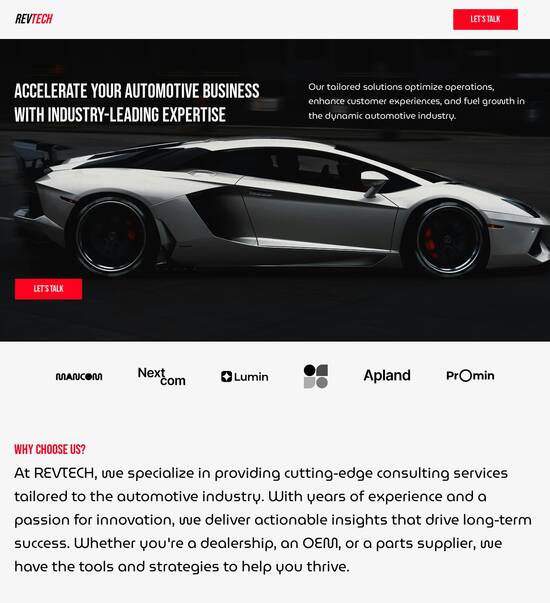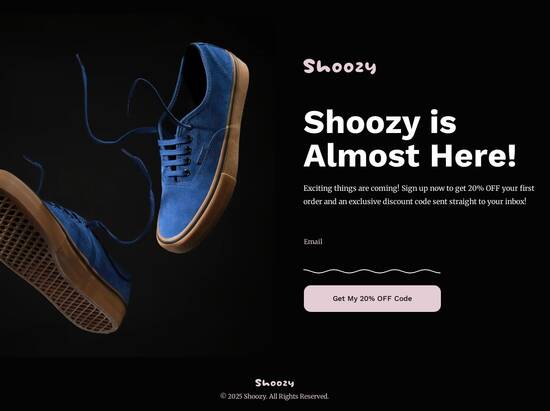
Web page template for EdTech companies
Use TemplateAbout template
Give your EdTech companies a boost with our professional landing page templates. Ready to turn visitors into customers?
Recommended templates

Easy to build without coding
With the intuitive drag-and-drop builder, anyone on your team can create high-converting pages without any knowledge of code or design. Make enhancements to your landing page with custom widgets using Javascript, HTML/CSS, or third-party scripts.

Multiple layouts for any industry and goal
Select from 500+ landing page layouts built to boost conversions across industry-specific scenarios. Customize them by adjusting fonts, adding images, and generating on-brand content with the AI assistant. Quickly scale with Instablocks® and Global Blocks that you can save, reuse, and update globally.

Loads fast and looks polished on any device
Every template is responsive, which means they present professionally on any device and load blazingly fast with our Thor Render Engine. You can also power them up with Google AMP technology to deliver an unparalleled mobile experience and drive higher conversions.

Robust analytics & experimentation
Get real-time updates and reporting across all your devices, showing the number of visitors, conversions, cost-per-visitor, and cost-per-lead. Launch AI-powered experiments, run A/B tests, and use heatmaps to analyze user behavior, then optimize your landing page to maximize conversions.







Easy to build without coding
With the intuitive drag-and-drop builder, anyone on your team can create high-converting pages without any knowledge of code or design. Make enhancements to your landing page with custom widgets using Javascript, HTML/CSS, or third-party scripts.
Multiple layouts for any industry and goal
Select from 500+ landing page layouts built to boost conversions across industry-specific scenarios. Customize them by adjusting fonts, adding images, and generating on-brand content with the AI assistant. Quickly scale with Instablocks® and Global Blocks that you can save, reuse, and update globally.
Loads fast and looks polished on any device
Every template is responsive, which means they present professionally on any device and load blazingly fast with our Thor Render Engine.
Robust analytics & experimentation
Get real-time updates and reporting across all your devices, showing the number of visitors, conversions, cost-per-visitor, and cost-per-lead. Launch AI-powered experiments, run A/B tests, and use heatmaps to analyze user behavior, then optimize your landing page to maximize conversions.
All the features you need to build lead-generating landing pages
Explore more featuresLearn how to build top-performing landing pages for any goal
FAQs
Leading the way in building high-performing landing pages





Harness the power of Instapage for your online marketing strategy
Instapage offers a comprehensive solution tailored for web page templates catering to EdTech companies. These templates are pivotal for enhancing the online educational marketing strategy, ensuring a streamlined approach to lead generation and conversion optimization. By leveraging Instapage's resources, you can create compelling landing pages designed specifically for the education sector.
Identifying the right web page template for EdTech companies
Choosing the appropriate web page template involves understanding your audience's needs and preferences. You want a template that resonates with your educational offerings and encourages user engagement. This includes elements that highlight courses, certifications, and educational resources.
- User-Friendly Design: EdTech web pages must simplify navigation, allowing potential students to find course information quickly.
- Visual Appeal: Engaging visuals and responsive design that capture the essence of your learning experience enhances user experience.
- Optimized for Mobile: Considering that many users search for educational resources on mobile devices, your template should be fully responsive.
Step 1: Customize your template with Engaging Content
The first step in utilizing your EdTech web page template is to populate it with engaging content that speaks to your audience. Highlight unique selling points, such as expert faculty, innovative coursework, and student testimonials.
Step 2: Leverage Lead Generation Elements
Incorporating lead generation elements is essential. Using Instapage's tools can elevate your template's potential to capture leads effectively and lead to conversions.
- Lead Capture Forms: Place strategically across the webpage, directing prospective students to provide their information.
- Call-to-Action Buttons: Ensure they are clearly visible and encourage user interaction, e.g., 'Get Started' or 'Enroll Now'.
- Incentives: Offering downloadable resources or trial classes can entice users to share their contact information.
Step 3: Optimize for SEO
The final step involves optimizing your EdTech web page template for search engines. This helps attract organic traffic, enhancing visibility in a crowded market.
- Keyword Enrichment: Use relevant keywords within your content to boost search visibility. Keywords like 'online courses', 'educational resources', and 'learning platforms' should be integrated naturally.
- Meta Tags: Incorporate well-crafted title and description tags that encapsulate your offering’s essence.
- Content Freshness: Regularly update your web page with new content to keep it relevant and engaging.
By following these guidelines, you'll create an effective web page that not only attracts potential students but also provides them with a seamless experience.
Start leveraging Instapage today to transform your online presence with specialized web page templates for EdTech companies. Experience the difference firsthand!
Transforming digital learning: The role of web page templates in EdTech
The importance of a strong online presence for edtech companies
The competitive landscape of educational technology is fierce, presenting unique challenges for edtech companies vying for attention in a crowded market. As technology continues to evolve, the significance of having a robust online presence grows. Edtech companies must seamlessly convey their value proposition to stand out. A strong website acts as a gateway, attracting potential customers and nurturing existing relationships, all while exhibiting professionalism and authority.
Building credibility and trust through web design is critical. Prospective clients are more likely to engage with a site that appears well-crafted and user-friendly. When users encounter well-designed web experiences, it fosters trust and reflects the quality of the products or services being offered. Studies have shown that 75% of consumers evaluate a company's credibility based on its website design alone, highlighting the direct correlation between web presence and consumer perception.
A dedicated online platform enhances brand visibility, ensuring that potential customers discover edtech solutions effectively. Well-structured websites using engaging web page templates can significantly improve search engine rankings, ultimately driving traffic. Consequently, as edtech companies invest in their online presence, they've observed increased leads, user engagement, and enrollment rates.
Understanding web page templates: A game changer for edtech
Web page templates serve as pre-designed layouts designed to streamline the website creation process. In the edtech sector, these templates facilitate rapid deployment of online resources. Unlike traditional web design methods that often require lengthy and costly development cycles, templates offer a cost-effective alternative, allowing organizations to launch their online initiatives promptly.
By utilizing web page templates, edtech companies can custom tailor their websites to suit educational needs without the need for extensive technical expertise. They simplify the process, allowing educators to focus on content rather than getting bogged down with web design intricacies. This shift promotes efficiency and ensures that vital educational content is made readily accessible to potential users.
Key features of web page templates designed for edtech
One of the most notable aspects of web page templates is their customization capabilities. Edtech companies can adapt templates to meet changing educational needs and branding requirements. Customizable elements may include color schemes, fonts, and layouts, enabling companies to maintain brand consistency while also catering to specific audience preferences. This flexibility is essential in an industry that often targets diverse audiences with varying requirements.
Another vital feature is responsive design. Given the diverse needs of learners, it's paramount that educational content is accessible on various devices. With responsive templates, users can experience a seamless interface whether using a smartphone, tablet, or desktop. This mobile-friendliness enhances user experience and interaction rates, vital for edtech companies hoping to encourage active learning.
Variety of template types for different edtech applications
Edtech requires various template types to address distinct applications. Landing pages for courses and programs need features that effectively drive user registrations. Critical elements might include compelling testimonials, clear course outlines, and enriched descriptions that define each program's benefit to potential learners.
Blog templates for educational content are also essential for establishing thought leadership. Engaging formats that incorporate multimedia elements—like videos and infographics—can significantly enhance readability and interest. Event pages for webinars and conferences must include promotional elements such as countdown timers, speaker bios, and participant registration details. Lastly, portfolio templates for educators allow them to showcase their qualifications and teaching philosophies, encouraging connection with both students and educational institutions.
Innovative themes for unique edtech experiences
In the vast landscape of education, thematic designs can create unique experiences that resonate with specific educational philosophies. For instance, themes targeted at K-12 education often emphasize vibrant colors and interactive features to capture younger audiences' attention, whereas higher education themes may opt for more subdued tones and professional layouts to appeal to adult learners and academics.
Corporate training themes can integrate gamification elements, making learning more engaging and directly applicable to the workplace. Examples of themed elements include visual storytelling through consistent imagery and cohesively structured content with interactive features that promote user engagement, making the learning experience not just informative but also enjoyable.
Enhancing user experience with functional elements
Enhancing user experience through engaging call-to-actions (CTAs) is essential in converting site visitors into participants. To craft compelling CTAs, edtech companies should focus on concise language, enticing offers, and strategic placement throughout the template. These CTAs guide users towards desired actions, resulting in more course sign-ups or downloads.
Implementing interactive features like quizzes and surveys enrich the user journey. These elements not only engage users but also provide valuable feedback, allowing edtech companies to adapt their offerings to better meet user needs. Additionally, multimedia integrations such as videos, infographics, and podcasts can effectively capture attention and communicate complex ideas more clearly, making learning more appealing.
SEO optimization within web page templates
For edtech companies, it’s essential to incorporate SEO best practices tailored for educational content. Key strategies include targeting relevant keywords associated with educational technology, which can significantly improve search visibility. A well-structured template not only influences how content is displayed but also plays a crucial role in how search engines index pages.
Utilizing alt text and metadata effectively can further enhance the visibility of templates. By ensuring that images and videos have descriptive tags, edtech companies can improve their search engine ranking while also ensuring that content is accessible to those with disabilities. This multi-faceted approach to SEO ensures that educational offerings reach a broad audience, ultimately translating into increased engagement.
Security and support considerations for edtech web templates
Given the sensitive nature of data in educational tools, security becomes paramount. Edtech companies must prioritize the protection of user information. This involves ensuring templates are designed with security in mind, thereby mitigating potential data breaches. Backend engineers play a crucial role in implementing security measures that safeguard personal information.
Moreover, support mechanisms for template users should be robust. A dedicated development team can provide ongoing assistance, ensuring that any issues are promptly addressed. Providing accessible documentation and responsive customer support not only enhances user experience but also fosters trust and loyalty among users, encouraging them to return.
Cost-effectiveness of using web page templates
When considering the financial implications of web page templates, it's imperative to analyze pricing models. Some templates come with one-time purchases, while others operate on subscription models, each presenting unique advantages. Startups can benefit significantly, as many providers offer discounts or packages tailored to budget-conscious organizations.
The long-term savings afforded by template ecosystems are noteworthy, allowing edtech companies to invest in other innovative areas. Rapid updates and maintenance through predefined templates can lead to improved efficiency and lower ongoing operational costs, ultimately enhancing the company's bottom line.
Success stories: The impact of effective web design on edtech outcomes
The transformative effects of effective web design are illustrated through numerous case studies in the edtech field. Companies that invested in customizing their web page templates have reported remarkable improvements in user engagement and conversion rates. Metrics exemplifying these successes may include significant increases in course enrollments, extended time on site, and enhanced user interaction.
Quotes from industry leaders frequently highlight the value of dedicated web experiences. For instance, one CEO stated, 'Our new web platform increased our enrollment by 50% within six months of launch.' Such testimonials illustrate precisely how effective web design can drive tangible results, ultimately impacting educational outcomes positively.
Future trends: What's next for web page templates in edtech?
Looking ahead, advancements in artificial intelligence integration may revolutionize web page templates in the edtech sector. AI tools are poised to personalize learning experiences further, creating tailored pathways for individual users. This paradigm shift could significantly enhance how educational content is delivered and consumed online.
Predictions indicate that user interface trends for educational websites will continue to evolve, emphasizing simplicity and functionality. Upcoming themes and template innovations will likely incorporate more interactive and immersive elements, keeping pace with technological advancements and learner expectations.
Addressing challenges: How to avoid common pitfalls
It's essential to identify and mitigate key challenges related to using web page templates. One common issue is template spam, leading to generic-looking websites that fail to engage users effectively. To avoid this pitfall, it's crucial for edtech companies to regularly assess and curate their web content, ensuring freshness and relevance.
Best practices for maintaining a clean, professional web presence include regularly updating designs, removing outdated content, and optimizing performance. Suggestions for ongoing optimization involve leveraging user feedback to tweak layouts and features, keeping pace with emerging trends, and ensuring that the website consistently meets its users' needs.
Collaboration between designers and software engineers in template development
The synergy between creative design teams and backend engineers is essential for effective template development. Collaboration fosters efficient workflows, allowing for rapid development and iterative testing. By engaging in regular discussions, both teams can ensure that templates align with user needs while maintaining a coherent aesthetic.
Feedback loops are vital. Continuous improvement processes, driven by user analytics and design reviews, enable teams to refine templates after initial launches. This commitment to collaboration ensures that edtech companies can deliver quality web experiences that resonate with their audience and adapt to emerging trends.
Ready to skyrocket conversions?
Supercharge your ad campaigns with high-performing landing pages
Get started














